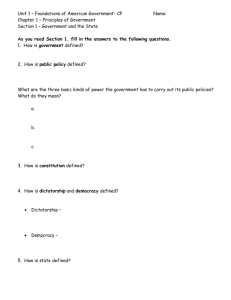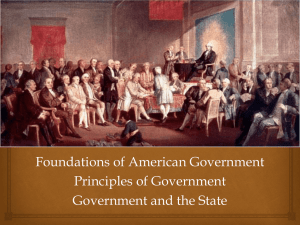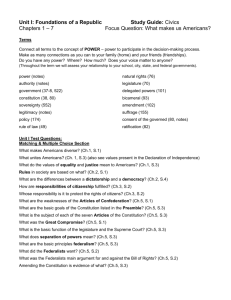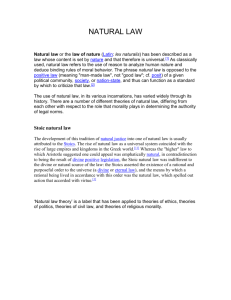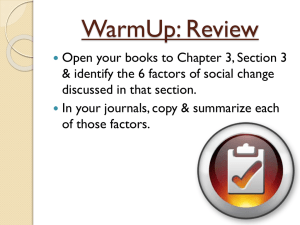Principles of Government Worksheet: Foundations of US Gov
advertisement
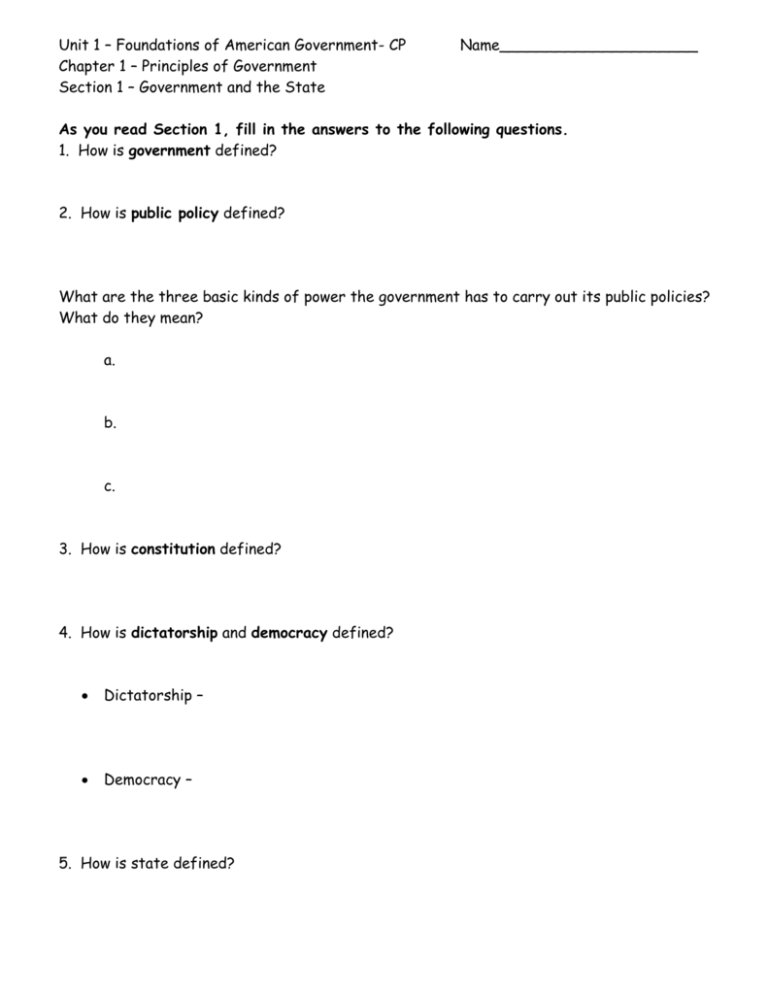
Unit 1 – Foundations of American Government- CP Chapter 1 – Principles of Government Section 1 – Government and the State Name_____________________ As you read Section 1, fill in the answers to the following questions. 1. How is government defined? 2. How is public policy defined? What are the three basic kinds of power the government has to carry out its public policies? What do they mean? a. b. c. 3. How is constitution defined? 4. How is dictatorship and democracy defined? Dictatorship – Democracy – 5. How is state defined? 6. The state has four characteristics. How are they defined? a. Population – b. Sovereignty c. Territory – d. Government 7. What are the four most influential theories about the origin of the state and how are they defined? a. b. c. d. 8. Which of the two theories might be used to explain the origins of Japan, which has an emperor typically chosen from the same family. a. the force theory and the divine right theory b. the evolutionary theory and the force theory c. the evolutionary theory and the divine right theory 9. Which of the following statements about sovereign states is NOT true? A. Sovereign states decide their own foreign and domestic policies. B. Sovereign states may be possessed by other nations. C. A dictatorship may exist in a sovereign state. D. Sovereign states have supreme power within their own territories. 10. Which of the following most accurately describes the force theory of the origin of states? A. God gave rulers the right to run states. B. States originated from the force of the strongest individuals. C. States were patterned after the institution of the family. D. States began when people agreed to give up power to the state to promote the general welfare. 11. Which of the theories for the development of government appears to be supported by our system of government? A. Force Theory C. Divine Right Theory B. Evolutionary Theory D. Social Contract Theory The Purpose of Government The main purposes of government are described in the Preamble of the Constitution of the United States: “We the People of the United States, in Order to form a more perfect Union, establish Justice, insure domestic Tranquility, provide for the common defense, promote the general welfare, and secure the Blessings of Liberty to ourselves and our Posterity, do ordain and establish this Constitution of the United States of America.” 12. For what purpose does government exist? List six. A. B. C. D. E. F. 13. Which of the following is a result of the government’s concern about the general welfare of its citizens? a. establishing a state church b. establishing schools, protecting the environment c. resolving disputes between local governments 14. Which of the following purposes of government is mainly concerned with other nations? A. Establishing Justice B. Promoting the General Welfare C. Forming a More Perfect Union D. Providing for the Common Defense 15. Which of the following statements about dictatorships is NOT true? A. one person or a small group holds power B. those in power hold absolute and unchallengeable authority C. dictatorships were unknown until modern times D. dictatorships are not responsible to the people and cannot be limited by them 16. According to Social Contract Theory A. the state was born of force B. the state developed gradually out of the early family C. those of royal birth have the right to rule D. the state exists only to serve the will of the people 17. All of the following are classifications based on geographic distribution of power EXCEPT A. unitary government B. confederate government C. federal government D. democratic government Unit 1 – Foundations of American Government- CP Chapter 1 – Principles of Government Section 1 – Government and the State Name_____________________ As you read Section 1, fill in the answers to the following questions. 1. How is government defined? One of the oldest human institutions; institution that makes and enforces public policies and enforces all of those things that government does. The institution through which society makes and enforces its pubic policies – 1st appeared when people decided there was no way to survive without some way to regulate their and their neighbors actions. 2. How is public policy defined? All those things a government decides to do. Taxation, national defense, education, crime control, health care etc. – ways to regulated people’s behavior What are the three basic kinds of power the government has to carry out its public policies? What do they mean? Legislative power – power to make laws Executive power – power to execute, enforce laws Judicial power – power to interpret laws 3. How is constitution defined? Body of fundamental laws setting out the principles, structure and processes of government 4. How is dictatorship and democracy defined? Dictatorship – form of government, rule not held responsible to the will of the people power held by single person or small group of people. Hitler, Castro Democracy – supreme authority over government rests with the people “We the People” 5. How is state defined? Over 190 exist today – a body of people, living in a defined territory, organized under a government and has the power to make and enforce laws without consent of a higher authority 6. The state has four characteristics. How are they defined? a. Population – state must have people, number of people have nothing to do with its existence: San Martino 25,000, Republic of China 1.4 billion as of 2010 b. Sovereignty – each state can decide its own foreign and domestic policies has supreme and absolute power with in its borders c. Territory – must have land, known and recognized boundaries, does not matter how much land – San Marino 24 square miles approx same size of South Whitehall Township Russia 6.6 million square miles d. Government – every state is politically organized – it is where the country exerts its will and words to accomplish its goals – has the authority to make and enforce public policies **Is Pennsylvania a state? Which characteristic is it missing? 7. What are the four most influential theories about the origin of the state and how are they defined? a. Force Theory: scholars believe that the state was born of force; one person or group claimed control over an area and subjected everyone to its rule b. Evolutionary Theory: state developed naturally out of the early family; primitive family – one person as head (soverign government); grew and developed into a clan and eventually a tribe which turned to farming and gave up nomadic ways c. Divine Right Theory: accepted in world during 15th – 18th centuries; state created by God – gave those of royal birth a “divine right” to rule; people obeyed ruler as they would God – opposition seen as treason and a mortal sin d. Social Contract Theory: humans began living in a state of no government and no person was subject to any superior power. People could take by force what belonged to them and there was no authority to protect one person from the acts of another. Individuals were only as safe as their own physical strength. Humans saw that this was a very un pleasant condition and agreed to create a state/government. They agreed to give up to the state as much power as was needed to promote the wellbeing of all. This con tract is similar to a constitution. The state exists only to serve the will of the people, who are the sole source of political power. Concepts that promoted this theory: Popular Sovereignty, limited govt, individual rights 8. Which of the two theories might be used to explain the origins of Japan, which has an emperor typically chosen from the same family. a. the force theory and the divine right theory b. the evolutionary theory and the force theory c. the evolutionary theory and the divine right theory 9. Which of the following statements about sovereign states is NOT true? E. Sovereign states decide their own foreign and domestic policies. F. Sovereign states may be possessed by other nations. G. A dictatorship may exist in a sovereign state. H. Sovereign states have supreme power within their own territories. 10. Which of the following most accurately describes the force theory of the origin of states? E. God gave rulers the right to run states. F. States originated from the force of the strongest individuals. G. States were patterned after the institution of the family. H. States began when people agreed to give up power to the state to promote the general welfare. 11. Which of the theories for the development of government appears to be supported by our system of government? C. Force Theory C. Divine Right Theory D. Evolutionary Theory D. Social Contract Theory The Purpose of Government The main purposes of government are described in the Preamble of the Constitution of the United States: “We the People of the United States, in Order to form a more perfect Union, establish Justice, insure domestic Tranquility, provide for the common defense, promote the general welfare, and secure the Blessings of Liberty to ourselves and our Posterity, do ordain and establish this Constitution of the United States of America.” 12. For what purpose does government exist? List six. A. B. C. D. E. F. To form a more perfect union Establish Justice Insure Domestic Tranquility Provide for the common defense Promote the General Welfare Secure the blessings of Liberty 13. Which of the following is a result of the government’s concern about the general welfare of its citizens? a. establishing a state church b. establishing schools, protecting the environment c. resolving disputes between local governments 14. Which of the following purposes of government is mainly concerned with other nations? E. Establishing Justice F. Promoting the General Welfare G. Forming a More Perfect Union H. Providing for the Common Defense 15. Which of the following statements about dictatorships is NOT true? A. one person or a small group holds power B. those in power hold absolute and unchallengeable authority C. dictatorships were unknown until modern times D. dictatorships are not responsible to the people and cannot be limited by them 16. According to Social Contract Theory A. the state was born of force B. the state developed gradually out of the early family C. those of royal birth have the right to rule D. the state exists only to serve the will of the people 17. All of the following are classifications based on geographic distribution of power EXCEPT A. unitary government B. confederate government C. federal government D. democratic government
